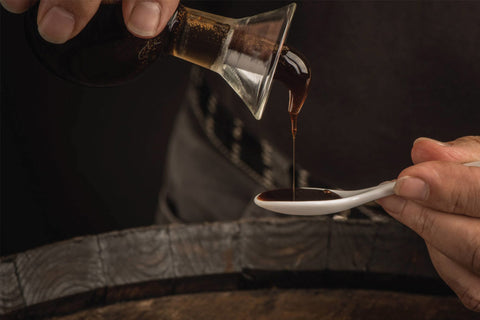Ahhh… Balsamic vinegar is something that you use in salad dressings, marinades, and various other dishes. It has that distinct, powerful, complex flavor and a tangy finish, as well as that rich flavor balanced by the acidity of the vinegar.
Balsamic vinegar is a dark brown vinegar made from unfermented grape juice. It’s a common ingredient in Italian dishes, and it’s been used in glazes, sauces, and reductions for a long time.
Authentic balsamic vinegar is pricey because it uses barrels to age it for months or even years. It is becoming increasingly popular in food preparations, particularly salad dressings and marinades. Many people also use it as a low-fat addition and as part of a heart-healthy diet.
Nutrition
Balsamic vinegar has a low-calorie count, making it an excellent method to flavor healthful dishes without adding fat or sodium.
It is a source of:
- Calcium
- Phosphorus
- Potassium
- Magnesium
- Acetic acid
Helps Your Skin
Antimicrobial chemicals and antioxidants in balsamic vinegar can aid with skin discoloration and acne. Consumption on a regular basis may help in the development of healthy, bright skin. Topical treatment is not recommended due to the strong odor and staining qualities.
Because of its strong smell, other kinds of vinegar, such as apple cider vinegar, may be more appealing as topical acne treatments. Balsamic vinegar’s dark, the stain-prone tint may also deter you from using it straight on your face. On the other hand, Balsamic vinegar contains acetic acid, antibacterial properties, and antioxidants. When used as part of a healthy diet, it can help your skin seem clearer and brighter.
Lowers Cholesterol Levels
This is possibly the most well-known of all the benefits of balsamic vinegar. It is a fantastic alternative for people who want to keep their cholesterol levels in check or lower them. Its antioxidants target “scavenger cells” that produce harmful for the body and raise your LDL (bad cholesterol) levels.
Regularly ingesting balsamic vinegar can assist your body in protecting itself from clogged arteries, which can help you maintain or lower your cholesterol levels.
Keeps Your Gut Happy
The main ingredient of vinegar is acetic acid, which comprises probiotic bacteria strains, is the principal active ingredient in balsamic vinegar. These probiotics aren’t just good for preserving food; they can also help with digestion and intestinal health. These beneficial microorganisms, known as the gut biome, have also been linked to improved immune function. Probiotics also enhance your immune system.
Lowers Blood Sugar
Vinegar is an anti-glycemic agent that helps to maintain insulin sensitivity. Balsamic vinegar can help you minimize blood sugar increases after eating by using it as a salad dressing or condiment.
According to a 2010 study, vinegar contains anti-glycemic characteristics, which helps reduce blood sugar rises after meals.
Researchers discovered that adding vinegar to a high-carb meal improved post-meal insulin sensitivity and mealtime blood sugar in a 2006 assessment of the benefits of vinegar. It was, however, more helpful for people who had insulin sensitivity than for people who had type 2 diabetes.
In a more recent study, people with type 2 diabetes who took vinegar for 8 to 12 weeks only had a very tiny reduction in blood sugar levels.
Balsamic vinegar can benefit people with diabetes and insulin resistance by adding it to their meals. A balsamic vinegar-based dressing is far superior to a heavy mayonnaise-based dressing.
Boosts Your Circulation
Balsamic vinegar comes from grapes, which shows that it inhibits blood clotting in experimental trials. Grapes have been discovered to inhibit blood platelets from aggregating, which may help to prevent heart disease. This could be one of the reasons why Mediterranean civilizations have been using balsamic vinegar as a “healing” and “anti-aging” substance for ages.
Balsamic vinegar’s antioxidants help to maintain good blood circulation and cardiovascular health. It also helps red blood cells move through your circulatory system by preventing platelets from clumping together.
Dials Down on Blood Pressure
The benefits of balsamic vinegar for your cardiovascular system also extend to lowering blood pressure. In a 2001 laboratory study, rats with hypertension had lower blood pressure after drinking vinegar for a lengthy period of time. You’re not only improving the taste of your food by using 1 to 2 teaspoons of balsamic vinegar as a dressing or marinade; you’re also improving your heart health.
Fights Acid Reflux
You may use balsamic vinegar to help with acid reflux and heartburn. Because this remedy may not work for everyone, it’s a good idea to start with a tiny dose and wait a few hours to observe if it improves or worsens symptoms.
Eases Congestion
You can use balsamic vinegar to alleviate congestion. Steaming vinegar may aid in the removal of phlegm from the throat and chest. You can achieve this by adding a few drops of vinegar to heating water and inhaling the vapor.
Weight Loss
Like the rest of the vinegar family, Balsamic vinegar has anti-obesity properties. It has probiotic ingredients that help you feel satiated for longer. Balsamic vinegar is also fat-free, unlike other flavoring agents like butter and mayonnaise. Though it isn’t a miracle weight-loss panacea, there’s reason to assume that including it in your diet can help you achieve your weight-loss goals.
According to some older studies, eating ordinary vinegar for breakfast will help you eat fewer calories the remainder of the day, which can help you lose weight. In a lab investigation, acetic acid in vinegar reveals to have fat-burning properties in mice.
While balsamic vinegar will not melt fat overnight, it could be a helpful tool for a healthy weight loss journey if that is your objective.
Eliminates Bacteria
Balsamic vinegar’s acetic acid may have an antibacterial impact, reducing the microorganisms found on lettuce and other types of food. According to studies, salmonella levels on crops like arugula may be reduced by exposing them to vinegar.
Balsamic vinegar’s acidity can cause problems, including enamel erosion and heartburn if used too much. Even by ingesting tiny doses of balsamic vinegar, you can still obtain the benefits it has. Drinking too much can induce an upset stomach and other problems, so restrict one’s intake to around 2 tablespoons or less. So be careful not to use it too much!
Try Euromercato’s variety of balsamic vinegar for your salad dressings and let your body feel the different benefits.














